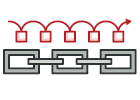
Chain of Responsibility em C#
O Chain of Responsibility é um padrão de projeto comportamental que permite passar a solicitação ao longo da cadeia de handlers em potencial até que um deles lide com a solicitação.
O padrão permite que vários objetos tratem a solicitação sem acoplar a classe remetente às classes concretas dos destinatários. A cadeia pode ser composta dinamicamente em tempo de execução com qualquer handler que siga uma interface de handler padrão.
Uso do padrão em C#
Complexidade:
Popularidade:
Exemplos de uso: O padrão Chain of Responsibility não é um padrão frequente em um programa C#, pois é relevante apenas quando o código opera com cadeias de objetos.
Identificação: O padrão é reconhecível pelos métodos comportamentais de um grupo de objetos que indiretamente chamam os mesmos métodos em outros objetos, enquanto todos os objetos seguem a interface comum.
Exemplo conceitual
Este exemplo ilustra a estrutura do padrão de projeto Chain of Responsibility. Ele se concentra em responder a estas perguntas:
- De quais classes ele consiste?
- Quais papéis essas classes desempenham?
- De que maneira os elementos do padrão estão relacionados?
Program.cs: Exemplo conceitual
using System;
using System.Collections.Generic;
namespace RefactoringGuru.DesignPatterns.ChainOfResponsibility.Conceptual
{
// The Handler interface declares a method for building the chain of
// handlers. It also declares a method for executing a request.
public interface IHandler
{
IHandler SetNext(IHandler handler);
object Handle(object request);
}
// The default chaining behavior can be implemented inside a base handler
// class.
abstract class AbstractHandler : IHandler
{
private IHandler _nextHandler;
public IHandler SetNext(IHandler handler)
{
this._nextHandler = handler;
// Returning a handler from here will let us link handlers in a
// convenient way like this:
// monkey.SetNext(squirrel).SetNext(dog);
return handler;
}
public virtual object Handle(object request)
{
if (this._nextHandler != null)
{
return this._nextHandler.Handle(request);
}
else
{
return null;
}
}
}
class MonkeyHandler : AbstractHandler
{
public override object Handle(object request)
{
if ((request as string) == "Banana")
{
return $"Monkey: I'll eat the {request.ToString()}.\n";
}
else
{
return base.Handle(request);
}
}
}
class SquirrelHandler : AbstractHandler
{
public override object Handle(object request)
{
if (request.ToString() == "Nut")
{
return $"Squirrel: I'll eat the {request.ToString()}.\n";
}
else
{
return base.Handle(request);
}
}
}
class DogHandler : AbstractHandler
{
public override object Handle(object request)
{
if (request.ToString() == "MeatBall")
{
return $"Dog: I'll eat the {request.ToString()}.\n";
}
else
{
return base.Handle(request);
}
}
}
class Client
{
// The client code is usually suited to work with a single handler. In
// most cases, it is not even aware that the handler is part of a chain.
public static void ClientCode(AbstractHandler handler)
{
foreach (var food in new List<string> { "Nut", "Banana", "Cup of coffee" })
{
Console.WriteLine($"Client: Who wants a {food}?");
var result = handler.Handle(food);
if (result != null)
{
Console.Write($" {result}");
}
else
{
Console.WriteLine($" {food} was left untouched.");
}
}
}
}
class Program
{
static void Main(string[] args)
{
// The other part of the client code constructs the actual chain.
var monkey = new MonkeyHandler();
var squirrel = new SquirrelHandler();
var dog = new DogHandler();
monkey.SetNext(squirrel).SetNext(dog);
// The client should be able to send a request to any handler, not
// just the first one in the chain.
Console.WriteLine("Chain: Monkey > Squirrel > Dog\n");
Client.ClientCode(monkey);
Console.WriteLine();
Console.WriteLine("Subchain: Squirrel > Dog\n");
Client.ClientCode(squirrel);
}
}
}
Output.txt: Resultados da execução
Chain: Monkey > Squirrel > Dog
Client: Who wants a Nut?
Squirrel: I'll eat the Nut.
Client: Who wants a Banana?
Monkey: I'll eat the Banana.
Client: Who wants a Cup of coffee?
Cup of coffee was left untouched.
Subchain: Squirrel > Dog
Client: Who wants a Nut?
Squirrel: I'll eat the Nut.
Client: Who wants a Banana?
Banana was left untouched.
Client: Who wants a Cup of coffee?
Cup of coffee was left untouched.